Contents
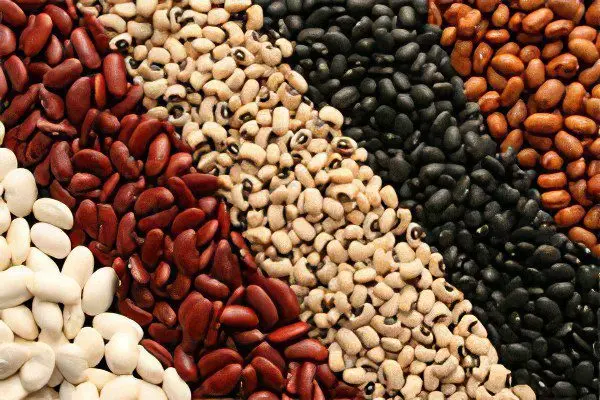
Beans are the oldest leguminous crop that mankind discovered for itself more than 8 thousand years ago. Since then, the popularity of the product has only increased exponentially. Today, some peoples of the world cannot imagine a single feast that would take place without beans. So, in Japan, cakes with bean paste are very popular, and in the British they have breakfast with beans in tomato sauce with toast and fried sausages.
In Russia, beans are a popular dish among vegetarians and among people who adhere to proper nutrition. However, this legume is not as simple as it might seem, and there are certain contraindications to its use. But knowing what are the benefits and harms of beans for health, it will be possible to fearlessly eat this product.
What are the benefits of beans?
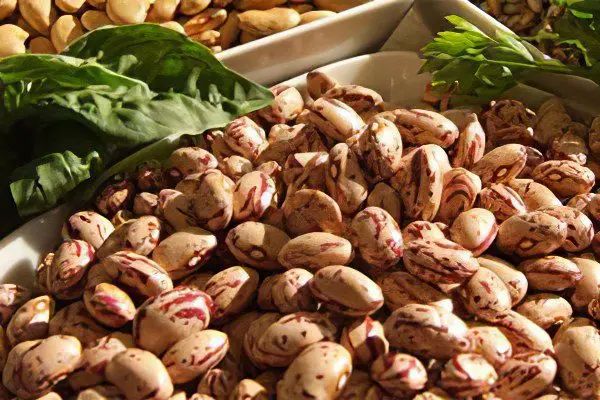
There are about 200 types of beans in the world, for example, there are green beans, red beans, green beans, purple and yellow beans, white and black beans. However, in terms of their chemical composition and nutritional value, these legumes do not differ much.
The benefits of beans for human health are obvious, because it contains an impressive set of vitamins and minerals. Beans have the whole set of B vitamins, vitamin C, vitamin E, and also: iron, potassium, calcium, magnesium, sulfur, iodine, chromium, phosphorus and other minerals necessary for the normal functioning of the body.
Composition and calorie content
Calories 339 KKal
- Fats:
1,1 g
- Proteins:
24,2 g
- Carbohydrates:
60 g
- Water:
10,7 g
- Ash:
4 g
- Cellulose:
22 g
Vitamins (in 100 g): | Quantity | %RDN |
Vitamin B9 (folic acid) | 394-482 μg | 109,5% |
Vitamin B1 (thiamine) | 0,53-0,65 mg | 34,7% |
Vitamin B6 (pyridoxine) | 0,4-0,45 mg | 21,2% |
Vitamin B4 (choline) | 96,7 mg | 19,3% |
Vitamin B5 (pantothenic acid) | 0,78-1,1 mg | 18,8% |
Vitamin B2 (riboflavin) | 0,22-0,24 mg | 11,5% |
Vitamin K | 6-19 μg | 10,4% |
Minerals (in 100 g): | Quantity | %RDN |
Bor | 490 mcg | 700% |
Vanadium | 190 mcg | 475% |
Silicon | 92 mg | 306,7% |
Cobalt | 18,7 mcg | 187% |
Nickel | 173,2 mcg | 115,5% |
Manganese | 1340 mcg | 67% |
Copper | 580 mcg | 58% |
Phosphorus | 447-480 mg | 57,9% |
Molybdenum | 39,4 mcg | 56,3% |
potassium | 1100-1387 mg | 49,7% |
Rubidium | 43,5 mcg | 43,5% |
Selenium | 24,9 mcg | 38,3% |
Hardware | 5,47-5,9 mg | 37,9% |
Magnesium | 103-189 mg | 36,5% |
Zinc | 3210 mcg | 26,8% |
Zirconium | 13 mcg | 26% |
Chrome | 10 mcg | 20% |
Strontium | 15-270 μg | 17,8% |
Titanium | 150 mcg | 17,6% |
Sulfur | 159 mg | 15,9% |
Calcium | 150-175 mg | 14,8% |
Full chemical composition ➤
Other important connections:
Phytosterols — 127 mg (230,9% of RDI)
Purine — 75 mg (61% of RDI)
Oxalic acid — 78 mg (19,5% of RDI)
Useful Properties
Among the useful properties of the product are the following:
Beans contain a large amount of protein, which is the main building material for body cells. Beans are recommended to be included in the menu of people involved in sports or hard physical work. Thanks to the protein, it helps to gain strength and will make it possible to properly form muscles.
Beans are high in fiber, which helps the body get rid of toxins.
Eating beans does not contribute to a sharp increase in blood sugar, which means that the risk of developing diabetes is reduced. Beans contain arginine, so it is recommended to include it in the menu of people already suffering from diabetes.
Due to the plant fibers, polyphenols, phytosterols and saponins that make up the bean, its regular consumption can reduce cholesterol levels, and therefore reduce the risk of developing atherosclerosis of the vessels.
There is evidence that beans prevent the development of colon cancer.
Beans contain choline, which contributes to the normalization of the liver, kidneys and brain, and also takes part in metabolic processes.
Regular consumption of beans can increase the secretion of gastric juice, which helps to remove stones from the gallbladder.
Sulfur, which is part of the beans, helps to eliminate pain in rheumatism, helps the body quickly cope with intestinal infections, with diseases of the upper respiratory tract.
Beans contain ascorbic acid, which increases the body’s resistance to various infections. In terms of vitamin C content, beans are superior to peaches, plums and apricots.
Beans are rich in antioxidants that prevent premature aging of the body. The darker the seeds, the more antioxidants the beans have.
Beans contain amino acids such as tyrosine and methionine, which are necessary for the normal functioning of the nervous system and help get rid of depression.
Beans are good for teeth, they prevent the formation of tartar.
It is good to use beans for women during menopause, as it contains quercetin and anthocyanins, which contribute to the normalization of hormonal levels.
Beans in moderation should be present in the diet of pregnant women. It allows you to block the body’s need for iron, which prevents the development of anemia. Also, beans help to reduce swelling due to its diuretic effect, as it contains a lot of potassium.
The diuretic effect of beans also helps prevent the formation of kidney stones.
Beans are a dietary product. It can be used for fasting days for overweight people. Beans contribute to rapid satiety and allow you to not feel hungry for a long time. Vegetarians eat beans as a substitute for meat.
Beans are included in the menu of people with arrhythmia.
Beans contain sulfur and zinc, which are necessary for maintaining the beauty of nails, skin and hair.
benefits of canned beans
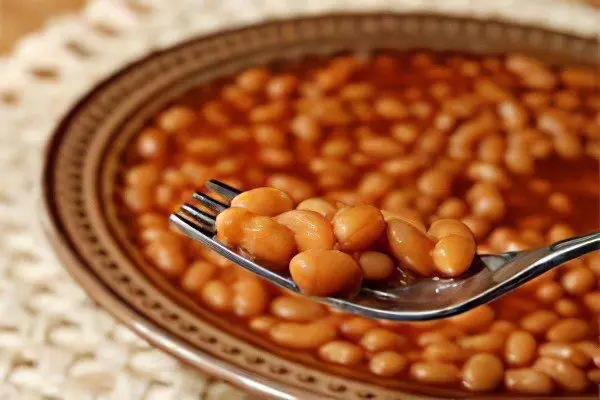
Beans in jars are a very tasty product that is ready to eat and does not require cooking. Therefore, it is often used for cooking various dishes and as an independent side dish. However, to maximize the benefits of canned beans, they must be properly processed.
It is no secret that acetic acid, salt and other substances are used for preservation to extend the shelf life of the product. Therefore, before serving or before adding to the finished dish, canned beans should be washed under running water, and the brine contained in the jar is best drained. Thus, you can get a useful product, without harm to the body.
In canned beans, vegetable fiber, potassium, magnesium, protein are preserved, but at the same time there is practically no fat in it. In general, canned beans retain more than 70% of their nutrients. Therefore, it can be added to salads, vegetable stews, and also consumed as an independent dish. Canned beans contribute to weight loss, as they retain a feeling of satiety for a long time. However, the product should be consumed in moderation.
Beans from a tin or glass jar enhances intestinal motility and increases the secretion of gastric juice. This contributes to the normalization of digestion and stabilization of microflora. At the same time, you should not eat the product against the background of colitis, peptic ulcer of the stomach and duodenum, as well as gastritis, so as not to overload the inflamed digestive organs with work.
Do frozen beans keep their health benefits?
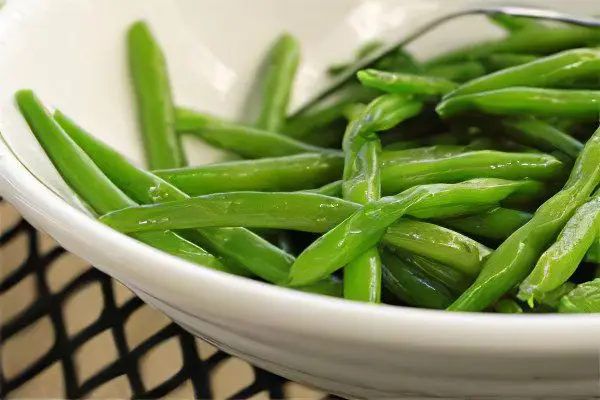
Freezing beans allows them to be stored for a long time, but many people wonder if frozen beans retain their health benefits. After freezing and re-defrosting, almost all useful substances are preserved in the beans. The content of vitamins decreases, but slightly. As for fiber, it is preserved in full. In addition, when freezing on an industrial scale, a system of partial dehydration of the product is used, so frozen green beans will contain 2 times more protein than fresh ones.
The benefits of frozen beans are comparable to the benefits of a fresh product, and you can use it at any time of the year. The only thing to pay attention to is re-freezing. The more often the product is thawed and re-frozen, the less vitamins remain in it. Therefore, when laying a large amount of beans in the freezer, it is necessary to divide it into portions. If green beans are frozen fresh, then the beans must first be boiled.
Do boiled beans retain their health benefits?
After cooking, beans retain all the nutrients, but the number of calories in it increases by almost 1,5 times compared to raw beans. Heat treatment of beans is a prerequisite; fresh product is not suitable for food. Raw beans contain toxins that are destroyed during cooking. Therefore, it is impossible to refuse heat treatment of beans.
What is the calorie content of beans?
The calorie content of 100 g of beans is about 100 kcal. These are average figures for all types of beans. The most low-calorie product is green beans, 100 g of which contains 24 kcal.
Possible harm and contraindications
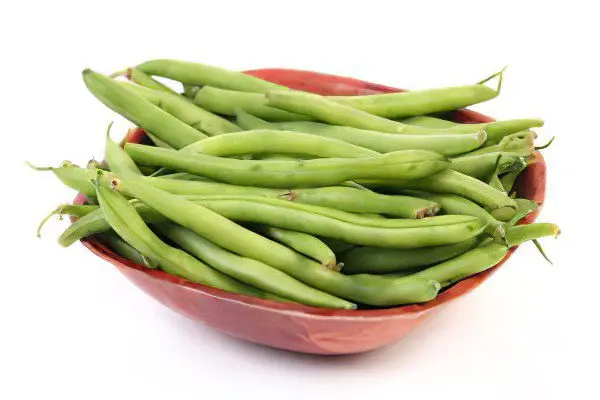
Although beans have many health benefits, they can be harmful in some cases.
Some of the carbohydrates contained in beans cannot be absorbed by the human body, which leads to flatulence. To reduce the content of these carbohydrates before cooking, the beans must be soaked for several hours in water with the addition of soda.
A large amount of fiber contributes to increased gas formation, and the enzymes secreted by the pancreas cannot cope with it. Bacteria that live in the intestines break down fiber, but at the same time they release a lot of gases. As a result, a person suffers from flatulence. To prevent this from happening, you need to eat beans in moderation and cook properly.
Raw beans can cause poisoning of the body. It contains such a toxic substance as phasin, but during heat treatment it decomposes. Therefore, you need to be especially careful when eating sprouted beans. It can provoke nausea, diarrhea, vomiting and other symptoms of intoxication.
Contraindications to the use of beans:
Gastritis with high acidity.
Peptic ulcer of the stomach and duodenum.
Colitis.
Cholecystitis.
Beans contain a large amount of purines, so it is not recommended to include it in the menu for people suffering from gout, so as not to provoke an exacerbation of the disease.
Elderly age. This does not mean that beans should be completely abandoned, but in elderly people, the metabolic rate is most often reduced, so you need to be very careful in including this product on the menu.
Care should be taken to use beans for lactating women, as it can cause bloating not only in an adult, but also in a child. Therefore, if the baby suffers from colic, then it is better to refuse beans for a while.
Allergy to beans is extremely rare. As a rule, it occurs in those people whose body gives a similar reaction to other legumes, such as peas or lentils. When rashes appear, it is necessary to stop eating beans and seek advice from an allergist.
How to cook beans properly?
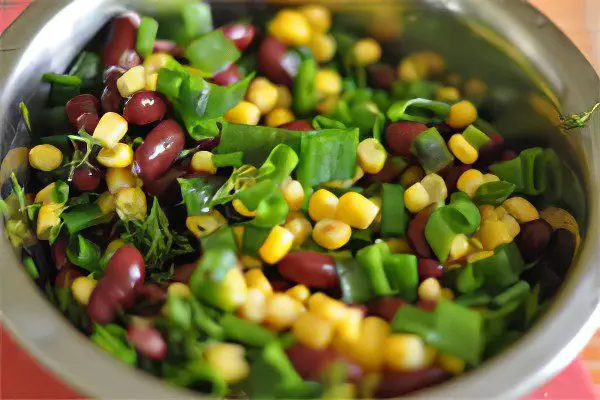
Beans need to be cooked properly to get the most out of them. Therefore, the following recommendations must be observed:
To begin with, the beans need to be sorted out, damaged fruits and foreign debris removed.
Then the beans should be soaked in cold water with the addition of a small amount of soda. Water should be twice as much as beans. Leave the beans to soak for 10 hours. You can change the water several times during this time.
Before cooking, the water is changed to a new one.
The pot does not need to be covered during cooking. Beans should also not be interfered with, otherwise it will lead to spoilage of the fruit. The fire must be small.
Salt beans after cooking. If you do this earlier, then the fruits will be tough.
If during cooking the water boils away, then you only need to add boiling water, otherwise it will crack.
To improve the taste, you can add 2-3 tablespoons of vegetable oil to the beans.
Beans must be brought to full readiness. Otherwise, you can get not only bloating, but also poisoning.
The average cooking time for pre-soaked beans is 40-90 minutes, depending on the variety. Properly cooked beans will surely delight not only with their benefits, but also with excellent taste.









